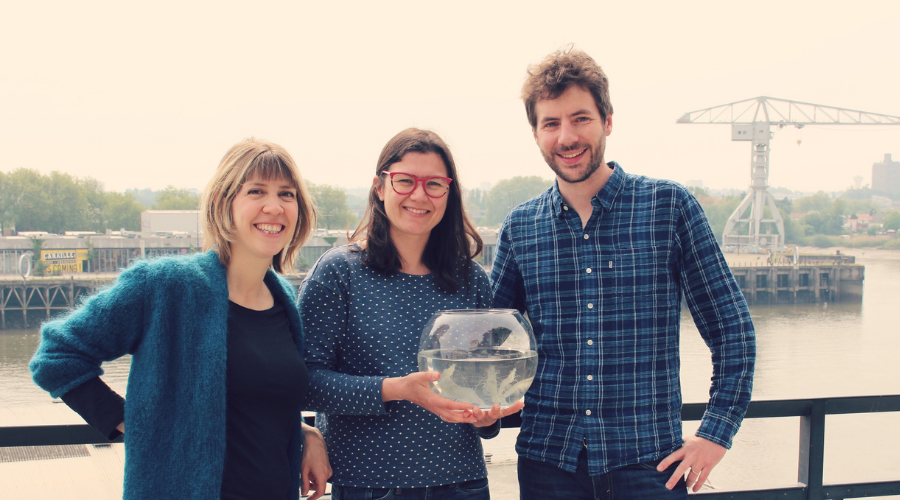Lisaqua’s “Permaquaculture” Innovation, Bringing Virtuous Shrimps From Indoor Tanks To Plate
Aiming for a more sustainable kind of aquaculture, Lisaqua is rolling out its technology inspired by “permaquaculture” to breed king prawns indoors, without any polluting discharge or antibiotics thanks to the creation of an ecosystem involving different marine species. The startup will soon open its first industrial-scale farm and plans to make a splash in

Sauteed with garlic and a pinch of chili, sizzled with pastas or on skewers with a fresh salad… Not only have king prawns become a staple of gourmet dishes and haute cuisine in France – they are also generally very popular, being the second most consumed seafood in the country, which imports 80,000 tons of frozen shrimp every year. But as tasty as they are, these crustaceans are an environmental disaster: Their farming, for the most part performed with the help of antibiotics and without water treatment, reportedly plays a big role in the pollution and destruction of mangroves on the southeast Asian coast.
Yet, all hope is not lost for environmentally-minded shrimp lovers, thanks to alternative solutions like Integrated Multi-Trophic Aquaculture (IMTA): The process involves two or more complementary organisms – vegetal and animal – being farmed together in a virtuous ecosystem where effluents are valorized and water naturally filtered.
Bringing shrimp farming indoors
Born in Nantes, western France, PhD in Marine Biology Charlotte Schoelinck discovered IMTA during her postdoctoral time in Canada, at the Ministry of Fisheries, Oceans and the Canadian Coast Guard. On the other side of the pond, these ecosystems were created and monitored in the sea — but what if, she wondered, they were to be replicated indoors?
Back in France, Schoelinck met with Caroline Madoc, an engineer out of the Ecole des Mines de Paris and Gabriel Boneu, an entrepreneur from HEC Paris. Together, they launched Lisaqua (the first four letters standing for “Low Impact and Sustainable Aquaculture”) in 2018. Their disruptive technology allows for the breeding of high-quality prawns in tanks, while microorganisms (bacteria and algae) filter the water and marine invertebrates, feeding on the shrimps’ effluents, are eventually turned into animal feed themselves. Through this process, the company saves 99% of water compared to traditional shrimp farming, and creates an environment where no antibiotics are needed.
Backed by regional and European funds, the startup – now classified as a deeptech company – received 1.4 millions euros from Bpifrance to further its research (including collaborative research led with public laboratories such as Agrocampus Ouest) and scale up. The push was crucial to convince other investors, who tend to be “wary when it comes to bringing financial support to young agricultural or biotech companies that might not be in a position to generate profit for years,” Lisaqua cofounder Gabriel Boneu says.
But it didn’t take long for Lisaqua’s innovation to reveal its potential. So far, the company has been able to produce one ton of shrimp a year on average, and will soon inaugurate its first big-scale aquafarm in Saint-Herblain, near Nantes. “Starting this summer, ten tons of triple zero guaranteed [zero antibiotics, zero kilometers traveled and zero polluting discharge] shrimp will be produced annually, to be sold in fishmongers and restaurants in the region,” the CEO explains.
Triple innovation for triple zero shrimps
This tenfold increase in production is only the beginning. “Our ultimate goal is to roll out a network of four to six suburban farms near France’s major cities before expanding to Europe and produce 10,000 tons of shrimp. That’s about 20% of the top-of-the-range fresh king prawns market,” Boneu says. And while finding enough space to fit the tanks can be a challenge, replicating the process without any loss of efficiency, is not. Why? Because Lisaqua’s innovation relies on three pillars: permaquaculture itself, with its optimal symbiotic mix of species; the modular engineering of the farms; and the monitoring system. For the latter, the company uses digital twin technology to analyze data from the farm and follow, adjust and optimize the parameters so they can be applied to other farms to match the performance.
As the pilot farm is virtually ready to open its doors, a new facility is already in the pipes near Paris, in Monthyon. There, the aquacultural startup aims to rely on the thermal energy generated by the household waste valorization process of the city’s energy recovery unit (ERU). A model Lisaqua plans to follow in all its future facilities: not only does building a farm next to agricultural or industrial sites allow the startup to recover and valorize their waste heat to keep its tanks at the right temperature but it also reduces even more the environmental footprint of the company and the production cost, especially in the current context where energy prices have dramatically gone up. Works on the Parisian farm are expected to start in 2024 and will create 40 jobs. In the meantime, Lisaqua’s 15-member team is already looking to expand this year with 10 new recruits.
After a first successful round of fundraising that brought the support of private investors and of the Le Gouessant Agricultural Cooperative (which also provides the pellets used to feed the shrimps), Lisaqua is planning on repeating the exercise in 2023. For now, Lisaqua is focused on its projects in France, even if demand is high in Europe. « There is so much to do in France, we want to focus on our network here, stay realistic and do things right. But we definitely plan to expand abroad once we have set up our first farms here,” Gabriel Boneu concludes.
Related
Trending

